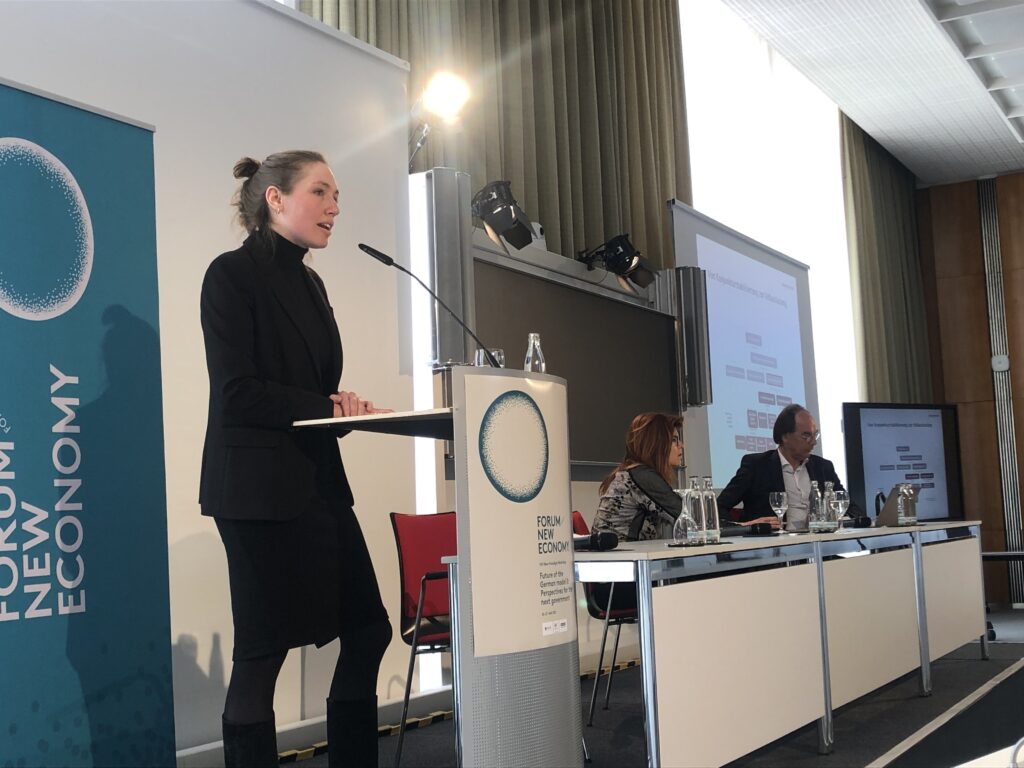VIII New Paradigm Workshop - Perspectives for the Next Government
25/05/2021 – 27/05/2021
PLACE
Hybrid
LANGUAGE
English and German with translation

Corona still dominates. But what comes after that? Where is the country – and the new government – headed? (Almost) all the answers are available at the eighth New Paradigm Workshop, this time on the “Future of the German Model” shortly before the Bundestag elections, which is also taking place with real participants again for the first time.
Inequality in Germany – How to reverse the trend
Is there only a perceived divergence of income and wealth in Germany? The factual situation and the assessment of concrete policy measures at the VIII. New Paradigm Workshop.
Inequality is the topic of the day. There will certainly be much debate about division in the country right up to the election, but not quite as much is known about the facts. Therefore, Stefan Bach and Markus Grabka presented the results of the third part of our project on inequality in Germany at the start of the workshop. Building on parts one – diagnosis and data situation – and two – on identifying the main drivers of inequality – the big question now was what exactly helps how well against a drifting apart of income and wealth. Would a wealth tax significantly reduce the gap between rich and poor at all? If not, what else?
The results of the project were discussed in advance with various experts, including Andreas Peichl from the Ifo Institute and Lucas Chancel from Team Piketty. On the panel now were: Martin Biewen from the University of Tübingen, Charlotte Bartels from DIW, and Clara Martinez Toledano from Imperial College Business School. Stefan Bach and Markus Grabka from the German Institute for Economic Research (DIW) first conducted a study to take stock of income and wealth inequality before examining the effectiveness of individual policy measures.
Watch the whole discussion
Economics of populism – Bidenomics as a blueprint for winning back the left behind?
Robert Gold has written a Forum New Economy study on the socio-economic causes of populism, which he presented at the VIII. New Paradigm workshop.
Robert Gold from the Kiel Institute for the World Economy has just written on the socio-economic causes of populism. The first steps were to identify the extent and driving forces. His paper now is an attempt to deduce which policies help against new bouts of populism. The study will soon be published on our website. There has been a real life experiment in this regard for a few weeks now: the major reform packages of the new US President Joe Biden – with the obvious aim of preventing Americans from electing a populist like Donald Trump again next time. Thomas Ferguson from the Institute for New Economic Thinking INET in New York has commented on the chances of Bidenomics on the panel. Other panellists on the fight against populism: Dalia Marin comparing populism in Germany and the US and Catherine Fieschi.
Watch the whole discussion
Talk with Dani Rodrik and Joe Kaeser: Capitalism under pressure – How to make globalization work for all
In their talk at the VIII. New Paradigm Workshop, Harvard economist Dani Rodrik and former Siemens CEO Joe Kaeser talked about good job policies, the purpose of business, and the taxation of SUVs.
In his keynote, Harvard economist Dani Rokdrik focussed on good job policies. He pointed towards the limits of the welfare state and the importance of jobs for the well-being. According to Rodrik, job policies should include better active market policies linked to employers, and industrial and regional policies targeting good jobs. He also stressed that technology is – like globalization – nothing god given, but can be shaped by policy. He argued that innovation policies should be directed towards labor friendly and less capital intensive technologies.
Ex-Siemens-CEO Joe Kaeser disagreed with Milton Friedman that the business of businesses is just business, but that companies need to serve society. Kaeser demanded from policy makers that they should be courageous enough to implement necessary reforms from a shareholder value world towards stakeholder capitalism.
Joe Kaeser and Dani Rodrik - The whole discussion
Financial supervision post Wirecard – Time for a new paradigm
Gerhard Schick and Martin Hellwig presented their suggestion of a paradigm change in German financial supervision on the VIII. New Paradigm Workshop.
Does financial supervision not need a completely new self-image after all the scandals surrounding Wirecard and others – a new paradigm beyond the old proximity to the praised financial markets. This was the suggestion of Gerhard Schick and Martin Hellwig. Afterwards, Jörg Kukies, State Secretary at the Federal Ministry of Finance, and economist Daniela Gabor from Bristol commented on this suggestion. The moderator was Olaf Storbeck from the FT, which was instrumental in triggering the Wirecard scandal.
The whole discussion
Climate Challenge: Will Germany manage the transition?
The main question of the climate session on the VIII. New Paradigm Workshop was, how Germany can manage the transition to climate-neutrality by 2050 – or 2045.
There were times when Germany was considered a role model when it came to environmental and climate protection. Today, the question is whether the country can manage the great transition to make everything climate-neutral by 2050 – or 2045. Patrick Graichen from Agora Energiewende has presented how this could actually be achieved. What the transformation of the car industry will mean for employment and value creation in Germany in the coming years – that is what the experts from Boston Consulting have estimated in a previously unpublished study, the results of which were presented on the same panel.
In a Forum study, Tom Krebs estimated how much would have to be publicly invested in the conversion of the industry to green hydrogen.
Other panellists on the big question of whether Germany can manage the conversion: KfW chief economist Friederike Köhler-Geib and Laurence Tubiana from the European Climate Foundation. Chair: Carlo Jaeger of the Global Climate Forum.
The whole discussion
The Prudence Principle: A New Framework for Fiscal Policy
Mark Blyth and Eric Lonergan have presented their Forum paper on how, in principle, rules could be established that would be better than debt targets that have dominated in recent decades, especially in Europe.
An important political question today? How to deal with high levels of public debt after the Corona crisis – and how do previous debt and fiscal rules have to be reformed to achieve this? Mark Blyth from Brown University and Eric Lonergan of M&G Investments have presented their proposition of a new debt rule: the prudence principle. The idea is to have two different set of rules – depending on the economic regime, namely the relationship of interest rates on government bonds and growth rates. Their proposal was discussed with: Jakob von Weizsäcker, Chief Economist at the Federal Ministry of Finance, Peter Bofinger from the University of Würzburg and Véronique Riches-Flores from Paris.
Rewatch the session
Beyond the debt brake – Towards a more flexible German fiscal policy?
At the moment, there is much debate about the German debt brake. At the VIII. New Paradigm Workshop, Philippa Sigl-Glöckner and others discussed a proposal for a reform commissioned by the Forum New Economy.

Towards new fiscal rules for the euro zone?
Prominent French economists around Macron have written a reform proposal for the European Stability and Growth Pact and have discussed it at the VIII. New Paradigm Workshop.
In a policy paper for the Conseil d’analyse économique (CAE), French economists Philippe Martin, Jean Pisani-Ferry and Xavier Ragot developed a reform proposal for the European fiscal framework. Among other things, they call for the abolition of the rigid percentage limits and the criterion of measuring debt on the basis of economic performance, to allow the individual member states more flexibility in their budget planning, and to achieve better fiscal policy coordination within the Eurozone by taking greater account of macroeconomic imbalances.
What are the chances of this quasi-official French proposition? How should and will the new German government position itself on this issue? These questions were discussed at the VIII. New Paradigm Workshop.
The study’s authors have first presented their reform proposal. Participants in the subsequent discussion were Annamaria Simonazzi, economics professor at the Sapienza University of Rome, the Head of the European Department at the Ministry of Finance Thomas Westphal, and the Bruegel Director Guntram Wolff. The session was moderated by Martin Sandbu (Financial Times).
Rewatch the session here
On climate, jobs and financial stability: Towards a new mandate for central banks?
Whether the ECB needs a new mandate was discussed on the VIII. New Paradigm Workshop by Isabel Schnabel, Adam Tooze, Moritz Schularick, and Laurence Tubiana.
There was a time when the world still seemed a good – and above all simple – place for monetary authorities. Every few weeks, they had to decide whether, in view of the latest price developments, it would be better to raise the key interest rates by a quarter point – or not. That was a long time ago. Today, central bankers are in demand whenever banks are in crisis or investors flee government bonds. What’s more, they could even help save the climate, ECB chief Christine Lagarde admits.
Don’t the monetary guardians need a new mandate right away? This highly sensitive question was the subject of day 3 of the VIII. New Paradigm Workshop.
ECB Director Isabel Schnabel gave a keynote speech on the extent to which central banks can (co-)bear social responsibility – without losing their independence. You can reread the whole speech here.
Afterwards, Adam Tooze raised the question of whether the ECB might not be best served with a new mandate – because it has no choice but to worry about the stability of financial markets, the drifting apart of wealth, or saving the climate. In the Forum study he presented, Moritz Schularick described how the guiding principles and paradigms of central banks can change. Both studies will soon be published on our website. The discussion was moderated by Laurence Tubiana, professor of economics and CEO of the European Climate Foundation.

